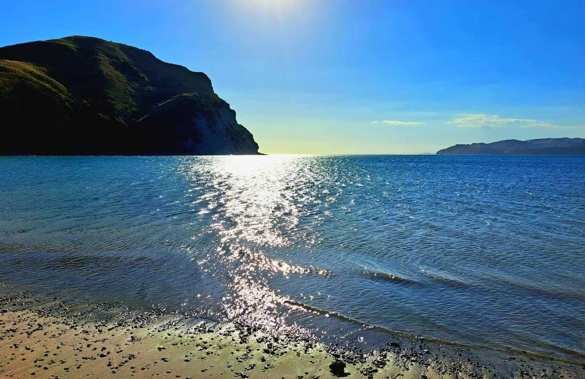
The Department of Conservation (DoC) says volunteers trying to refloat stranded whales face a heightened risk of shark attacks.
The warning comes after news that a huge shark killed a beached whale with her calf in Mahia on Sunday. A person waist-deep in the water trying to help the whale fled on seeing the shark.
/cloudfront-ap-southeast-2.images.arcpublishing.com/nzme/LWIR3Q7QUBGBJIDVNDQDUOAXFQ.jpg)
Whale strandings at Mahia Beach are not uncommon. Photo / Michaela Gower
A ranger later euthanised the calf when it became clear that refloating it was not an option.
Witnesses at the northern Hawke’s Bay beach told police the whale and its calf had made several attempts to strand themselves between Mahia Beach and Opoutama on the Mahia Peninsula.
Mahia sole charge police officer Chad Prentice said one person was in the water trying to save the mother when the attack occurred, killing the whale “instantly”.
Matt Tong, DoC operations manager for Tairāwhiti, said “well-meaning volunteers” could create a risk to themselves and the animals and should alert DoC first when they found a stranding.
The stranding in January of a pod of 40 false killer whales had increased the chance of sharks being in the waters around Mahia, he said.
“Several shark species feed on whales and dolphins, including their carcasses. Strandings are likely to lead to increased shark activity in the area, as they are attracted to feed on the remains.”
/cloudfront-ap-southeast-2.images.arcpublishing.com/nzme/BPG77OX2ZZD3LALUOM7BEALH2E.jpg)
A pygmy sperm whale calf was euthanised in Mahia after its mother was killed by a shark.
New Zealand was a hotspot for mammal strandings and Mahia Peninsula had a significantly high number of non-herd strandings.
“Approximately 70 per cent of pygmy sperm whale strandings in New Zealand occur between Hawke’s Bay and the East Cape, and on average we attend around 10 strandings per year across this area.”
There were multiple theories why whales and dolphins stranded, he said. In many cases, the cause was unknown and unlikely to be due to one factor.
“For many strandings, it can be very difficult to determine the reasons or to link them to other events.”
Often sick, distressed or dying whales, or mothers having difficulty giving birth, would come into shallow water and strand.
This was especially the case for single whales or mother/calf pairs. With mass strandings, strong social bonds could lead to a herd following a sick or disorientated pod member into trouble.
Strandings can be reported on the DOC emergency hotline 0800 DOC HOT (0800 362 468).
Michaela Gower joined Hawke’s Bay Today in 2023 and is based in the Hastings newsroom. She covers Dannevirke and Hawke’s Bay news and has a love for sharing stories about farming and rural communities.
Take your Radio, Podcasts and Music with you









